Pope Francis this morning touched down in Sri Lanka at the start of a three-day visit aimed at encouraging reconciliation efforts in the wake of the country’s 26-year civil war.
In a speech on arrival in Colombo he urged the country to investigate what happened during the war which ended in 2009 and in which an estimated 80,000-100,000 people died.
Wearing a garland of white and yellow roses he said: "The process of healing also needs to include the pursuit of truth, not for the sake of opening old wounds, but rather as a necessary means of promoting justice, healing and unity.”
He was met by Maithripala Sirisena, who was elected President on Thursday, ending Mahinda Rajapaksa’s almost ten-years in office.
Leaving the airport, Francis’ open-topped white jeep briefly came to a halt surrounded by crowds lining the road. The motorcade's slow progress meant he arrived late in Colombo and cancelled an afternoon meeting with bishops.
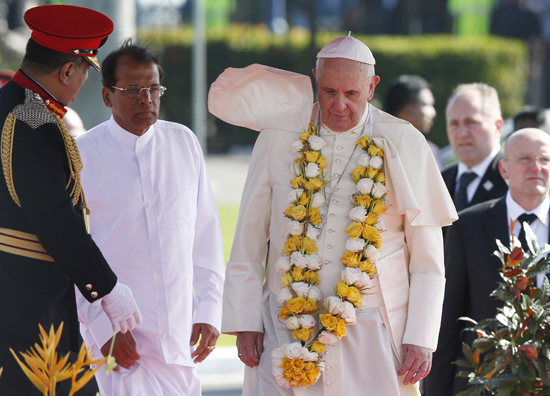 Fighting between the mainly Hindu Tamils and the and mostly Buddhist Sinhalese majority, ended in defeat for the Tamils. Observers say government commissions set up to investigate wartime atrocities have proved ineffective, and they criticised President Rajapaksa for refusing to let UN investigators into Sri Lanka. Meenakshi Ganguly, South Asia director of Human Rights Watch, added: "Sirisena has also said he is not going to back an international investigation."
Fighting between the mainly Hindu Tamils and the and mostly Buddhist Sinhalese majority, ended in defeat for the Tamils. Observers say government commissions set up to investigate wartime atrocities have proved ineffective, and they criticised President Rajapaksa for refusing to let UN investigators into Sri Lanka. Meenakshi Ganguly, South Asia director of Human Rights Watch, added: "Sirisena has also said he is not going to back an international investigation."
In his opening speech Francis said: “It is no easy task to overcome the bitter legacy of injustices, hostility and mistrust left by the conflict. It can only be done by overcoming evil with good and by cultivating those virtues which foster reconciliation, solidarity and peace.”
He said all sectors of society must be allowed to take part. “Dear friends, I am convinced that the followers of the various religious traditions have an essential role to play in the delicate process of reconciliation and rebuilding which is taking place in this country. For that process to succeed, all members of society must work together; all must have a voice. All must be free to express their concerns, their needs, their aspirations and their fears. Most importantly, they must be prepared to accept one another, to respect legitimate diversities, and learn to live as one family.”
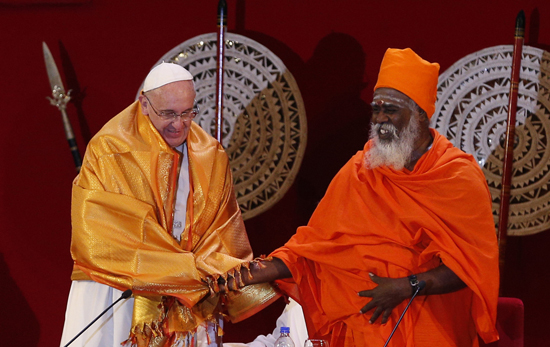 On Tuesday afternoon, the Pope met with local Buddhist, Hindu, Muslim and other Christian leaders, telling them that efforts at "interreligious and ecumenical relations take on a particular significance and urgency in Sri Lanka," as sources of "healing and unity" after years of "civil strife and violence."
On Tuesday afternoon, the Pope met with local Buddhist, Hindu, Muslim and other Christian leaders, telling them that efforts at "interreligious and ecumenical relations take on a particular significance and urgency in Sri Lanka," as sources of "healing and unity" after years of "civil strife and violence."
He said dialogue could not eliminate cultural differences but would emphasise the need for their acceptance. “If we are honest in presenting our convictions, we will be able to see more clearly what we hold in common," he said. "Men and women do not have to forsake their identity, whether ethnic or religious, in order to live in harmony."
The Pope urged followers of different religions to cooperate in social service, providing for the "material and spiritual needs of the poor, the destitute" and thus "rebuild the moral foundations of society as a whole."
At the interreligious meeting, held at a Colombo conference centre, a Hindu leader, speaking the Tamil language, voiced hopes for lasting peace and draped a saffron silk shawl over Pope Francis' shoulders.
A representative of the local Muslim community condemned "terrorism, racism, extremism," including recent killings by Islamist militants at a Paris newspaper and a military-run school in Pakistan.
A Buddhist monk, representing the faith of 70 percent of Sri Lanka's population, noted the common dedication of great religions to the values of love, self-sacrifice and peace, as well as the common susceptibility of humanity to hatred and violence.
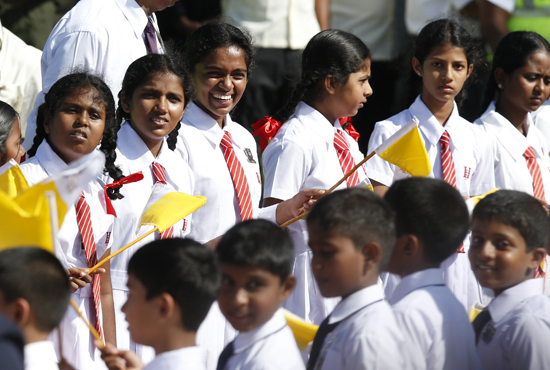
Pope Francis will canonise Blessed Joseph Vaz, Sri Lanka's first saint, on Wednesday at Galle Face Green, where St John Paul II beatified him in 1995. A half a million people are expected for the Mass.
After the canonisation Pope Francis will fly to the Marian shrine of Madhu, about 170 miles north of Colombo, where he will meet victims of the civil war after praying the rosary at the shrine.
Catholics fled to Madhu from nearby Mantai following persecution of Catholics and Dutch Calvinists in the 1600s. Carrying the statue of Mary with them, some Catholics built the Madhu church that has become the biggest pilgrim centre in Sri Lanka.
During the closing stage of the protracted war in 2008, the historic statue had to be removed from the shrine when it came under crossfire.
Reinforcing the theme of reconciliation, the vestments for the canonisation Mass have been stitched and woven by war widows of Sri Lankan soldiers and Tamil rebels, said Fr Tony Martin, deputy secretary-general of the bishops' conference.
"The whole Church of Sri Lanka is involved in the preparations. Each of the two dozen committees have bishops, priests and others from the dioceses," Fr Martin said.
For the canonisation of Blessed Joseph Vaz at Madhu, the choir will sing in Sinhalese and Tamil languages as a sign of the county's ethnic diversity and unity.
The Sri Lankan Government has released hundreds of state buses to parishes to transport the Catholics to the canonization; 20,000 security personnel will be deployed for crowd management.

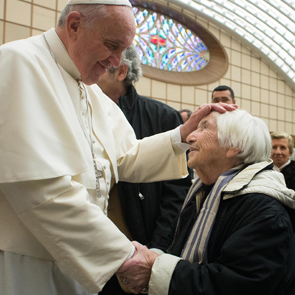
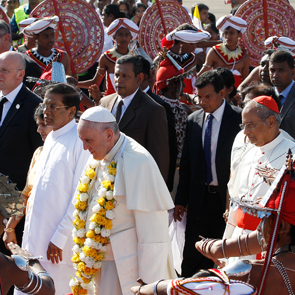

 Loading ...
Loading ...